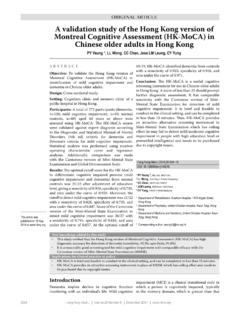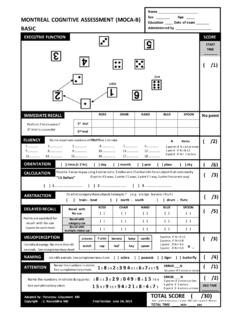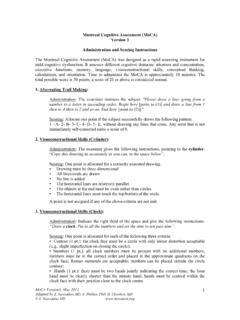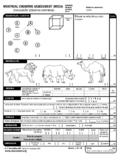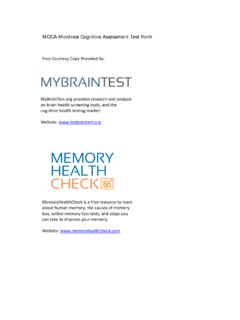Transcription of Conversion Between Mini‐Mental State Examination, …
1 Conversion Between Mini-Mental State examination , MontrealCognitive assessment , and Dementia Rating Scale-2 Scores inParkinson s DiseaseInger van Steenoven, BSc,1*Dag Aarsland, MD, PhD,1,2,3 Howard Hurtig, MD,4 Alice Chen-Plotkin, MD,4 John E. Duda, MD,5 Jacqueline Rick, PhD,4 Lama M. Chahine, MD,4 Nabila Dahodwala, MD,4 John Q. Trojanowski, MD, PhD,4,6 David R. Roalf, PhD,7 Paul J. Moberg, PhD,7and Daniel Weintraub, MD5,8,91 Division of Neurogeriatrics, Department of Neurobiology, Care Sciences and Society, Karolinska Institute, Stockholm, Sweden2 Centre for Age-Related Diseases, Stavanger University Hospital, Stavanger, Norway3 Department of Neurology, Akershus University Hospital, Oslo, Norway4 Department of Neurology, Perelman School of Medicine at the University of Pennsylvania, Philadelphia, USA5 Parkinson s Disease Research, Education and Clinical Center, Philadelphia Veterans Affairs Medical Center, Philadelphia, USA6 Department of Pathology and Laboratory Medicine, Perelman School of Medicine at the University of Pennsylvania, Philadelphia.
2 USA7 Department of Psychiatry, Neuropsychiatry Section, Perelman School of Medicine at the University of Pennsylvania, Philadelphia, USA8 Mental Illness Research, Education and Clinical Center, Philadelphia Veterans Affairs Medical Center, Philadelphia, USA9 Department of Psychiatry, Geriatric Psychiatry Section, Perelman School of Medicine at the University of Pennsylvania, Philadelphia, USAABSTRACT: cognitive impairment is one of theearliest, most common, and most disabling non-motorsymptoms in Parkinson s disease (PD). Thus, routinescreening of global cognitive abilities is important for theoptimal management of PD patients. Few global cognitivescreening instruments have been developed for or vali-dated in PD patients.
3 The Mini-Mental State examination (MMSE), montreal cognitive assessment ( moca ), andDementia Rating Scale-2 (DRS-2) have been used exten-sively for cognitive screening in both clinical and researchsettings. Determining how to convert the scores betweeninstruments would facilitate the longitudinal assessmentof cognition in clinical settings and the comparison andsynthesis of cognitive data in multicenter and longitudinalcohort studies. The primary aim of this study was to applya simple and reliable algorithm for the Conversion ofMoCA to MMSE scores in PD patients. A secondary aimwas to apply this algorithm for the Conversion of DRS-2 toboth MMSE and moca scores. The cognitive perform-ance of a convenience sample of 360 patients with idio-pathic PD was assessed by at least two of thesecognitive screening instruments.
4 We then developed con-version scores Between the MMSE, moca , and DRS-2using equipercentile equating and log-linear Conversion score tables reported here enable directand easy comparison of three routinely used cognitivescreening assessments in PD Interna-tional Parkinson and Movement Disorder SocietyKey Words:Parkinson s disease; Mini-Mental StateExamination; montreal cognitive assessment ; DementiaRating Scale-2; cognitive screening scalesNon-motor symptoms, including cognitive impair-ment, are common in patients with Parkinson s disease(PD). cognitive impairment is one of the earliest, mostcommon, and most disabling non-motor symptoms inPD. A range of cognitive domains are impaired in PDpatients, including visuospatial, executive, attention,and memory long-term prevalence ofPD dementia (PDD) is approximately 80%.
5 6,7 Mildcognitive impairment (MCI) has been reported in 20%to 30% of nondemented established PD patients,8andMCI is observed in 15% to 20% of newly diagnoseduntreated PD these reasons, routine cognitive screening isimportant for the optimal management of PD detailed neuropsychological testing is thegold standard for assessing specific neuropsychological---------------------- --------------------------------------*C orrespondence to:Inger van Steenoven; Division of Neurogeriatrics,Department of Neurobiology, Care Sciences and Society, KarolinskaInstitute, Stockholm, Sweden, E-mail: agencies:No financial support was received for this conflicts of interest/financial disclosures:Nothing to roles may be found in the online version of this :14 July 2014;Revised:15 September 2014;Accepted:23 September 2014 Published online 7 November 2014 in Wiley Online Library( ).
6 DOI: ARTICLEM ovementDisorders, Vol. 29, No. 14, 20141809functions, such extensive assessment is time consum-ing, and the use of briefer screening instruments forglobal cognition is a more practical approach in clini-cal care. Few global cognitive screening instrumentshave been developed for or validated in PD ideal screening instrument for cognitive impair-ment in PD should be brief, simple to administer, sen-sitive to subtle changes in cognition, unaffected bymotor and visual problems, and able to evaluate a fullrange of cognitive ,10 The 30-point Mini-Mental State examination (MMSE)11traditionally has been the most commonlyused cognitive screening instrument in both clinicaland research settings, because it can be administeredin 5 minutes.
7 However, the use of the MMSE in PDhas been questioned10,12for lacking sensitivity todetect subtle cognitive deficits and providing inad-equate assessment of executive ,13-16 The montreal cognitive assessment ( moca )17isalso a brief 30-point cognitive screening instrumentthat can be administered within 10 minutes. TheMoCA was shown to be more sensitive in detectingMCI in a group of healthy controls, MCI patients,and Alzheimer s disease (AD) patients (sensitivity of90%) compared with the MMSE (sensitivity of18%).17 Among PD patients who scored above theMMSE cutoff point for cognitive impairment (onlythose with a population-based age- and education-adjusted MMSE score in the top 75th percentile wereincluded), 52% were impaired according to the recom-mended moca cutoff score (<26).
8 18 This is likelybecause the moca more thoroughly assesses executiveabilities and is more challenging (ie, more items onmemory recall subtest). Thus, the moca appears tobe a superior screening instrument for cognitiveimpairment in PD compared with the ,18-20 Another widely used and more comprehensive cog-nitive screening instrument is the Dementia RatingScale-2 (DRS-2),21which takes 20 to 30 minutes toadminister. The DRS-2 is divided into five subscales:Attention, Initiation/Perseveration, Construction, Con-ceptualization, and original DRS dem-onstrated better convergent and divergent validitycompared with the MMSE or a battery of cognitivetests selected to assess specific deficits reported inPD,22and a more recent study of the DRS-2 demon-strated high sensitivity (92%) and specificity (91%) todiscriminate PD patients with from those the MMSE, moca , and DRS-2 are all stillwidely used in PD, we perceived the need to develop amethod for converting the score from one instrumentto the other two.
9 Such Conversion will facilitate boththe longitudinal assessment of cognition in clinical set-tings and the comparison and synthesis of cognitivedata from multicenter and longitudinal cohort recent study calculated a simple algorithm for theconversion of moca to MMSE scores in MCI patientsand patients with an algorithm has notbeen applied in PD patients. This must be done sepa-rately for PD, because the cognitive profile in PD dif-fers from that of AD,25and the relative performanceon the MMSE and moca will likely differ in the twodisease states . The primary aim of this study was todevelop and apply a simple and reliable algorithm forthe Conversion of moca to MMSE scores in PDpatients, and a secondary aim was to apply the algo-rithm for the Conversion of DRS-2 to both MMSEand moca PopulationA convenience sample (ie, those patients willing andable to complete a time-consuming research protocol)of 360 patients with idiopathic PD,26with a focus onnon-demented patients, were recruited prospectivelyfrom the Parkinson s Disease and Movement Disor-ders Center at the University of Pennsylvania and theParkinson s Disease Research, Education and ClinicalCenter at the Philadelphia Veterans Affairs MedicalCenter from 2007 through 2014 as part of ongoingstudies examining cognitive performance in PD.
10 Fromthis cohort, patients were assigned to three differentcohorts, based on which cognitive screening tests wereassessed at similar time points (ie, within 6 months ofeach other); 197 PD patients underwent both theMMSE and the moca , 254 both the MMSE and theDRS-2, and 256 both the moca and DRS-2. TheInstitutional Review Board at each participating insti-tution approved the study, and written informed con-sent was obtained from subjects before demographic and clinical information, includ-ing the Unified Parkinson s Disease Rating Scale motorexamination and Hoehn & Yahr stage (higher scoreindicating greater severity of motor symptoms or dis-ease severity),27were obtained. In addition, the15-item Geriatric Depression Scale was administeredto measure severity of depressive research staff administered the MMSE, moca , and DRS-2, without randomized or consistentordering.



